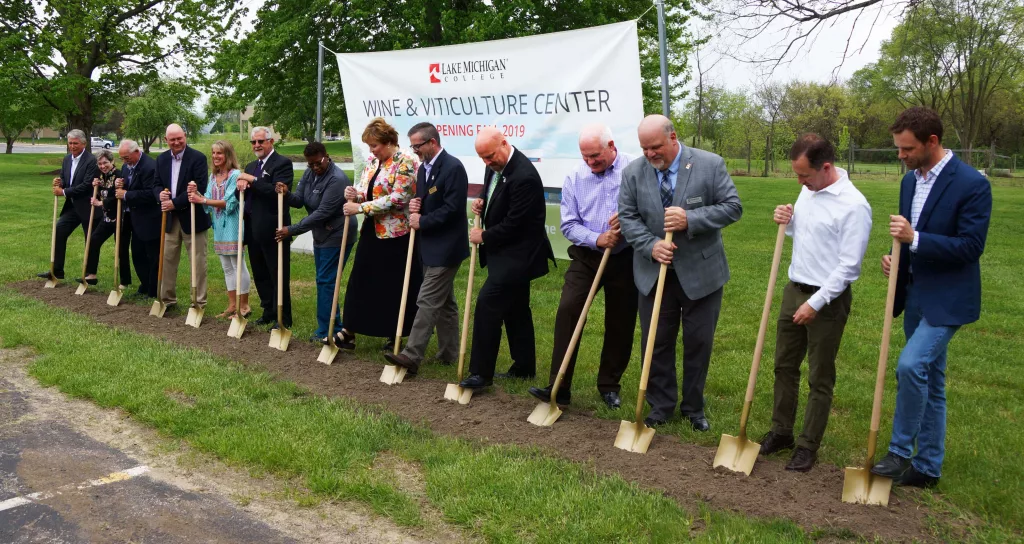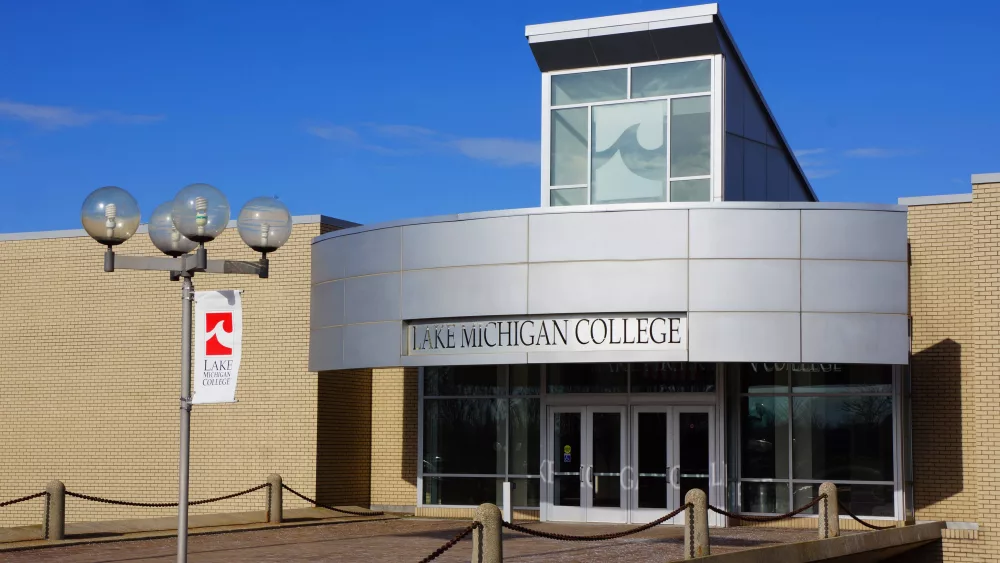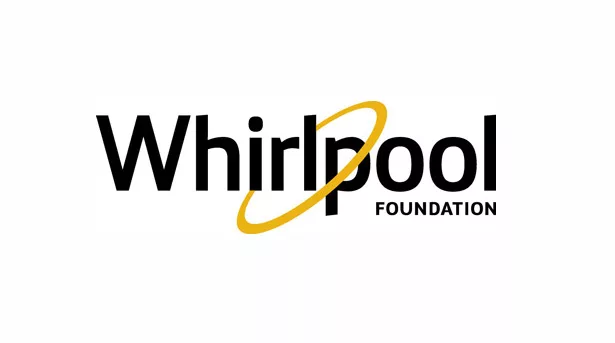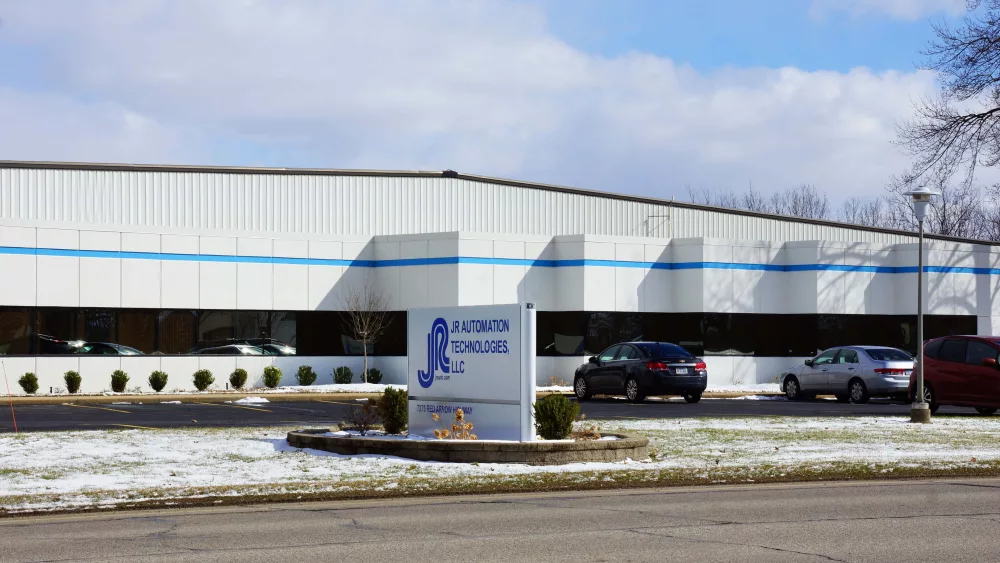If you want to see the potential impact of the new Lake Michigan College Wine & Viticulture Center getting underway on the north side of the Napier Avenue Campus compound look no further than current student Adam McBride. Already a professional winemaker and new winery owner, McBride delivered a glowing assessment of the Wine & Viticulture Technology Program at groundbreaking ceremonies Friday afternoon, telling the crowd on hand, “I’ve had some formal education over the years, but nothing I have come across in my studies out west in Napa, or even one on one with a consultant can touch the level that we get to in this program. The quality of instruction is world-class.”
McBride’s enthusiasm was clearly evident as the LMC President, Board Members, donors and industry leaders prepped for shovel duty on the opposite end of the Mendel Center parking lot from the Grand Upton Hall. As the new owner of Hickory Creek Winery in the middle of Berrien County, he told them all, “After just one semester, I use the knowledge from these courses multiple times a day. I feel more confident interacting with the guests in my tasting room, and more importantly I feel more confident about the decision I make on the production floor, in my barrel room, and in my lab.”
LMC Board Chair, Dr. Mike Lindley, delivered a traditional Italian toast, “Salute tutti,” adding in English, Blessings to you for 100 years.” Lindley called it an historic day, saying, “LMC has invested millions in the past 13 years to address high priority issues. Anticipating future trends, the college continues to deliver innovative instruction and continue to support the growing industries of tourism, hospitality, culinary, winemaking and viticulture, just to name a few.” He cited the college’s commitment to student success and “building a deep and talented workforce for our region,” as he punctuated that commitment saying, “Now is the time to invest in the future of our region, and the people who make Southwest Michigan great. Lake Michigan College plays a huge role in this process.”
Plans for the new Wine & Viticulture Education Center have been underway for four or five years, and the college’s President, Dr. Trevor Kubatzke, says, “This building has been on my mind virtually every day for over a year, and now we can give our students and the community a first class education center to help the Midwest advance and improve in its winemaking.” Kubatzke cited three major findings, “The wine industry is moving forward in Michigan, it is improving and growing every day, and the wine industry positively impacts the region’s economy and tourism and there is a need for hands-on training and education to prepare a workforce for that industry.”
The program got wheels when former President Bob Harrison found Program Director Mike Moyer in Walla Walla, Washington and lured him to the shores of Lake Michigan to take the reins. Moyer started operations in a two-room winery lab, fermentation room, and more in a small piece of the Mendel Center.
Kubatzke call the wine & viticulture curriculum, “A unique program in that we give the students an education from the planting of the first seeds to the tasting and selling of the wine, and everything in between. The quality and extent of the education they get is outstanding.” He told the crowd, “Today starts another chapter. While we’ve been producing wine and the program’s been going for a couple of years, we knew that we wanted to be a Midwest teaching winery and to do that we needed a facility that could handle more students, state of the art equipment, and produce a great opportunity for students. We’re finally bringing that to fruition today.”
Today’s ceremonies recognized lead donors Mike & Lisa Welch and Greg & Marian O’Niel as key players in the drive to create the center which also got a huge lift from the Campaign for Tomorrow capital campaign and a $1-million injection from the State of Michigan thanks to the hard work and diligence of former State Rep and Michigan Budget Director Al Pscholka who related the story of that journey today.
Michigan continues to gain recognition as a world-class wine region and Pscholka cited industry leaders like Karma Vista Winery’s Joe Herman who serves as a member of the Advisory Council that helps guide the wine and viticulture program at LMC.
Herman’s family is celebrating 171 years in the area this year as fruit farmers. He told the audience today, the family has always been in tree fruit, but says he got into the vineyards about 20 years ago. His Coloma properties span several hundred acres.
Herman says, “All great wine regions have two things in common: water on the left and the hand of God on the right. Think about that. You’ve got France, Italy, South Africa, South America, Australia, our friends on the west coast, and if you look from the space station down here you see Lake Michigan. Here we are, with all the advantages of a maritime climate, but all the safety of a continental climate.”
It was a bottle of Karma Vista Syrah sent to Moyer in Washington that convinced the program’s key player to come to Michigan. He said today, “I determined that if they can make a Syrah of this quality in southwest Michigan, we can grow anything. We can do a lot of things here. We can, and are, making world class wine here.”
Herman testifies to that versatility as well saying, “We can do things here that can’t be done anywhere else. Students coming here can learn Chardonnay, Riesling, Merlot, Syrah, Pinot Noir, along with all of the hybrid vines that are being planted throughout the Midwest. They can’t do that anywhere else.”
As he talked of the new Wine & Viticulture Education Center, Herman said, “We have to realize the gifts that we have. Unlike most of the winery regions, we also have access to an audience. We are within a four hour drive of 17-million people. Most wineries would kill for a population distribution like that.”
McBride is a new winery owner at Hickory Creek, but says, “I’ve been making wine in my kitchen for a few years, and even went through a harvest last fall and made a bunch of wine, using grapes from local sources.” He is in his early 40s and says his fellow students are a lot of “Like-minded people, who are passionate about wine, and want to further their wine education and expertise.” He adds, “Most of the students have an industry connection already, and others are looking to make that leap.”
As he addressed the potential for the new center, McBride argues, “Michigan has been making amazing wines for many years. For the most part because of the program I know what to do, and probably how to do it, but just knowing what and how to do something isn’t enough, if you’re learning something and truly learning it, you also need to know why you do it, and why you do any these things.” That, he says, “Is what this program has given me so far. You can’t develop the level of knowledge and understanding by simply following a checklist and watching YouTube videos on winemaking and pruning, It takes hours in the classroom, time in the lab, time in the vineyard, working hands-on with expert instructors like Mike Moyer and Mike DeSchaaf, that’s how you get that level of understanding.”
Wine instructor Moyer concurs, He says, “We emphasize hands on learning. You can’t learn about wine production and you can’t learn about grape growing by just watching it on TV. If you want to learn how things are done, and how the industry works, how wine is made, how grapes are grown, you need to have that hands-on component.”
Moyer adds, “A lot of people in Michigan don’t realize what we’re sitting on here is our ability to grow world-class wine grapes. That’s tremendous. That’s why this program exists, also to help be a supplier of a trained, educated, workforce that can grow quality wine grapes, here and elsewhere and turn them into quality wine, and understand how the business works, and how not to lose a whole bunch of money in the process. That’s our focus. The progress has been amazing.”
McBride says last summer when he was finalizing his winery purchase he drove around the Southwest Michigan wine trail, literally knocking on doors, trying to meet a handful of experts in the industry to give him advice on what to do as he was starting off, and one of the first names on the list of someone he had to get to know was that same Joe Herman.
New professional winemaker Adam says, “He (Herman) told me there’s three legs to running this business, there’s making wine, selling wine and growing wine fruit. He said, learn to do the first two, and worry about the third one later.” He nods affirmatively saying “It’s been true. This program has been invaluable to those efforts.” He also points out, “As I attempt to tackle the third aspect of producing more of my own fruit, Lake Michigan’s Wine & Viticulture Technology program will be at the foundation of all of that. What this program is doing and will continue to do for years to come is critically important to our industry and our local economy. What we the students of this program will be able to do, once this facility is completed, will make waves across the wine world, I’m convinced. We’re gaining more world class wine knowledge in our talents, to the industry here in Michigan and across the country. And around the globe for that matter. We have the ability to raise the reputation of this wine region, and put SW Michigan in its rightful place on the national and perhaps international stage.”
Joe Herman agrees and adds for emphasis, “We don’t want to teach people to be California. We don’t to teach people to be Washington, and we don’t want to teach people to be Bordeaux. We want to teach people to be Southwest Michigan. We want to discover what it is that makes us so great, and we are never done learning that.”
The knowledge in Southwest Michigan’s wine industry is significant. Joe Herman will tell you, “Wine isn’t measured in terms of decades, its in terms of generations. My son Keith is the 7th generation now.” He thanked former LMC President Bob Harrison for getting him involved. He also thanked the college board for thinking outside of the box (or bottle) as it is, and gave a shout out to the late Dave Braganini of St. Julian Winery, whose son John was in attendance today. He said Braganini was the one “Who was among the first to encourage me to start my own wine grapes. He said if it’s just a couple of us, we’ve got an interesting thing going on, if there’s a bunch of us, we’ve got an industry.”
Herman closed out his comments by saying that Braganini “Was so open and willing to share. That’s the way that we are in the wine industry. We want everyone to do well, we want everyone to make some great wine, and we want the world to find out about us. But if they don’t, that’s fine, we’ll just drink it!”
Future generations of winemakers will have the opportunity to learn the art, the science and the business of wine at the new Wine & Viticulture Center, but Herman cautioned, “Nothings going to be cheap, nothing’s going to be easy. You take your best shot, and it will take time. But eventually you have to put a shovel in the ground and plant it, that’s what we’re doing here today. It won’t be cheap, it won’t be easy, and it might take time, but you gotta put a shovel in the ground.” And then, they did just that, and celebrated with a little Lake Michigan Vintners, some other refreshments and will watch as the new center rises from the ground ready for action in 2019.






